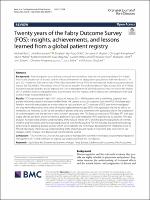| dc.contributor | Vall d'Hebron Barcelona Hospital Campus |
| dc.contributor.author | Beck, Michael |
| dc.contributor.author | Ramaswami, Uma |
| dc.contributor.author | Hernberg‑Ståhl, Elizabeth |
| dc.contributor.author | Hughes, Derralynn |
| dc.contributor.author | Kampmann, Christoph |
| dc.contributor.author | Mehta, Atul |
| dc.contributor.author | Pintos Morell, Guillem |
| dc.date.accessioned | 2022-09-09T12:37:18Z |
| dc.date.available | 2022-09-09T12:37:18Z |
| dc.date.issued | 2022-06-20 |
| dc.identifier.citation | Beck M, Ramaswami U, Hernberg-Ståhl E, Hughes DA, Kampmann C, Mehta AB, et al. Twenty years of the Fabry Outcome Survey (FOS): insights, achievements, and lessons learned from a global patient registry. Orphanet J Rare Dis. 2022 Jun 20;17:238. |
| dc.identifier.issn | 1750-1172 |
| dc.identifier.uri | https://hdl.handle.net/11351/8115 |
| dc.description | Agalsidase alfa; Cardiovascular outcomes; Renal outcomes |
| dc.description.abstract | Background
Patient registries provide long-term, real-world evidence that aids the understanding of the natural history and progression of disease, and the effects of treatment on large patient populations with rare diseases. The year 2021 marks the 20th anniversary of the Fabry Outcome Survey (FOS), an international, multicenter, observational registry (NCT03289065). The primary aims of FOS are to broaden the understanding of Fabry disease (FD), an X-linked lysosomal storage disorder, and to improve the clinical management of affected patients. Here, we review the history of FOS and the analyses and publications disseminated from the registry, and we discuss the contributions FOS studies have made in understanding FD.
Results
FOS was initiated in April 2001 and, as of January 2021, 4484 patients with a confirmed diagnosis and patient informed consent have been enrolled from 144 centers across 26 countries. Data from FOS have been published in nearly 60 manuscripts on a wide variety of topics relevant to FD. Analyses of FOS data have investigated the long-term effectiveness and safety of enzyme replacement therapy (ERT) with agalsidase alfa and its effects on morbidity and mortality, as well as the benefits of prompt and early treatment with agalsidase alfa on the progression of cardiomyopathy and the decline in renal function associated with FD. Based on analyses of FOS data, ERT with agalsidase alfa has also been shown to improve additional signs and symptoms of FD experienced by patients. FOS data analyses have provided a better understanding of the natural history of FD and the specific populations of women, children, and the elderly, and have provided practical tools for the study of FD. FOS has also provided methodology and criteria for assessing disease severity which contributed to the continuous development of medical practice in FD and has largely improved our understanding of the challenges and needs of long-term data collection in rare diseases, aiding in future rare disease real-world evidence studies.
Conclusion
FOS over the last 20 years has substantially increased the scientific knowledge around improved patient management of FD and continues to expand our understanding of this rare disease. |
| dc.language.iso | eng |
| dc.publisher | BMC |
| dc.relation.ispartofseries | Orphanet Journal of Rare Diseases;17 |
| dc.rights | Attribution 4.0 International |
| dc.rights.uri | http://creativecommons.org/licenses/by/4.0/ |
| dc.source | Scientia |
| dc.subject | Metabolisme - Trastorns - Tractament |
| dc.subject | Enzims - Ús terapèutic |
| dc.subject | Malalties rares - Tractament |
| dc.subject.mesh | Enzyme Replacement Therapy |
| dc.subject.mesh | Fabry Disease |
| dc.subject.mesh | /drug therapy |
| dc.subject.mesh | Registries |
| dc.title | Twenty years of the Fabry Outcome Survey (FOS): insights, achievements, and lessons learned from a global patient registry |
| dc.type | info:eu-repo/semantics/article |
| dc.identifier.doi | 10.1186/s13023-022-02392-9 |
| dc.subject.decs | tratamiento de sustitución enzimática |
| dc.subject.decs | enfermedad de Fabry |
| dc.subject.decs | /farmacoterapia |
| dc.subject.decs | sistema de registros |
| dc.relation.publishversion | https://doi.org/10.1186/s13023-022-02392-9 |
| dc.type.version | info:eu-repo/semantics/publishedVersion |
| dc.audience | Professionals |
| dc.contributor.organismes | Institut Català de la Salut |
| dc.contributor.authoraffiliation | [Beck M] SphinCS GmbH, Institute Clinical Science LSD, Hochheim, Germany. [Ramaswami U, Hughes DA] Lysosomal Disorders Unit, Institute of Immunity and Transplantation, Royal Free London NHS Foundation Trust, University College London, London, UK. [Hernberg-Ståhl E] Late Phase Solutions Europe AB, Täby, Sweden. [Kampmann C] Johannes Gutenberg School of Medicine, University of Mainz, Mainz, Germany. [Mehta AB] Department of Haematology, University College London, London, UK. [Pintos-Morell G] Reference Centre for Hereditary Metabolic Disorders (MetabERN), Vall d’Hebron Hospital Universitari, Barcelona, Spain |
| dc.identifier.pmid | 35725623 |
| dc.identifier.wos | 000813766600004 |
| dc.rights.accessrights | info:eu-repo/semantics/openAccess |

